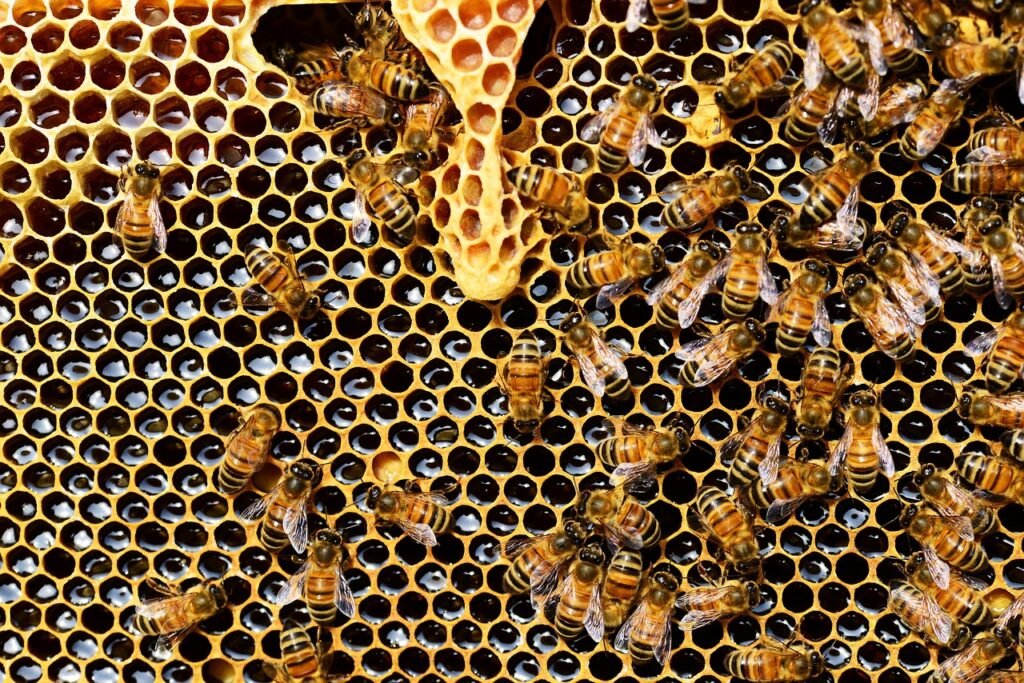Bee Propolis is a powerhouse of natural protection. Made by bees from plant resins and beeswax, propolis is used to seal, protect and sterilise the beehive at the entrance and sides (bee glue) toally sealing the inner hive, they repair the hive and clean themselves with the propolis before they enter the hive. It acts as the immune defence mechanism for the whole hive and protects against invaders and infection.Propolis is the bodyguard of the beehive, and also works in humans as it is made up of many compounds with bee saliva plant resins. Propolis is a hard waxy substance made from tree resins and does taste sweet even though it has no honey in it. It contains 55% resin, 30% beeswax. 10% etheric oils and 5% pollen (different ones vary in percentages), also high in bioflavinoids and is a complete protein as it contains all the B vitamins and amino acids. It contains albumen which is essential for blood fluidity and nutrient transport. It also has 14 of the 15 essential minerals that the body needs to exist the only one it doesn’t have is sulphur, but not all the trace minerals either. Other bee products include honey, royal jelly and bee pollen. All these bee products contain other substances which haven’t been studied but could be useful in human health.
It’s been used as a traditional health product for centuries, and modern science confirms that the protective properties of propolis have significant benefits for human health. Like chicken eggs propolis is a complete is a whole food and it does have a broad spectrum of elements and enzymes which work synergistically together.
Propolis has been used as a traditional health product since ancient times. It was used to treat sores, ulcers, oral infections and coughs by the ancient Greeks, and was even used as an embalming agent by ancient Egyptians (please don’t try this at home!). The protective power of propolis comes from the bioactives. Propolis products claiming only the amount of raw propolis with no mention of bioactives tell you nothing about the strength of the product. Raw propolis contains a lot of wax and impurities and may have very low levels of bioactives.
Modern research confirms high quality bioactive propolis has remarkable protective properties to support human health:
Antibacterial
Immune support
Anti-fungal such as candida and oral thrush
Anti-viral respiratory viral infestions.
Anti-tumour – studies have shown that it may reduce tumour size and prevent the development of cancer cells. It has enzymes which have strong anti oxidants including polyphenols.
Antioxidant protection – Important for healthy aging and cellular protection.
General Wellbeing – The powerful protective benefits of propolis provide broad support for overall health and wellbeing.
Increase fertility rate especially amongst women who have problems such as endometritis.
Good for these conditions
mouth Ulcers
wound Healing
Sinus Problems
Allergies,rashes
Flu / Colds
skin conditions, psorasis, acne these conditions will benefit from propolis.
blood vessel healing and protection
liver conditions
shingles, herpes, tinea, staph and other viral infections
there are all different qualities of propolis out there and it it is a matter of finding the best one and best form for you, ie those products which are bioactive. I think NZ has some of the best forms of propolis with their strong Manuka honey products.
honety products are always best keep organic when people start interfering with sprays , genetic engineering the product quality declines.
So be aware of harmful sprays, processing (heat vs cold pressed) methods, imported products and irradiation, storage methods and the larger the company probably more of the harnful processing such as antibiotics and contamination from lesser quality countries input. The best method is to locate good local honey producers.Another one is to get a beehive yourself , if you have an apartment roof maybe you could place one or two there with owners permission.
